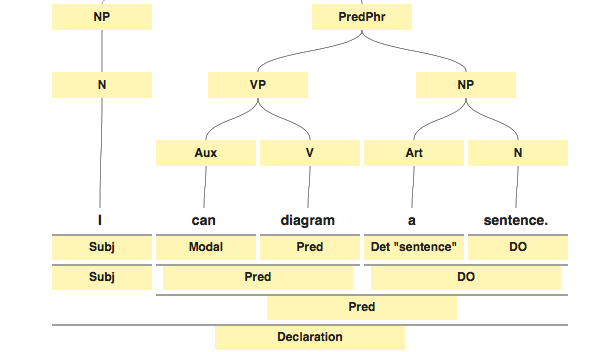So here’s the thing: I didn’t learn how to diagram a sentence until I was twenty-eight. I have two creative writing degrees from respected institutions. I know how to use coordinating conjunctions and semicolons. I’ve taught English composition and numerous creative writing workshops. Despite all of this experience, I did not learn the names of many basic parts of speech until last year. I knew “noun,” “verb,” and “adjective,” but that’s about it. Preposition? Article? Demonstrative? What? Relative pronoun? Ha!
This September, I went back to school for a Master’s in Professional Writing. I’m a part-time student, and I spent a lot of time last semester feeling harried and irritated, rushing from campus to Downtown Pittsburgh, where I teach high school. I needed to be at work by 12:30, and my twice-weekly grammar class let out at 11:50. This class almost always ran over, meaning I only had half an hour to make the commute; I routinely had to choose between being on time for work and going to the bathroom. I ate a lot of sandwiches while driving, clenching to keep from peeing my pants and swearing at undergrads, who loved diving in front of my car in pursuit of bagels or sushi-rito. I was my worst self on these drives, full of self-righteousness, edgy about teaching, and brimming with self-pity, because that required grammar class was completely kicking my ass.
~
Can you diagram this sentence?
Grammar is hard.

Okay, that one wasn’t actually hard. (Although, fun fact: I didn’t know “is” is a verb until this year. Did you know “is” is a verb??)
~
God, I hated grammar class. This wasn’t my professor’s fault. I was way behind and too proud and busy to ask for help. Most of my cohort had learned the basics years before. But while the high school I attended taught punctuation, they didn’t teach structural grammar, and trying to learn it in my late twenties made me feel intensely stupid. I sobbed while doing my homework, which took hours and was still mostly incorrect. I felt the way I did in secondary school, when I was forced to take math classes. It was the same panic that started in my groin, rising to my throat, so that I was tempted to burst into hysterical, frustrated, terrified laughter. It was the same instinct to shut down, to sulk and stop paying attention until we reached the next unit, which I might (hopefully) understand.
I’m supposed to be good at language. It’s the thing I’ve given my life to. But in grammar class, language betrayed me. I thought I understood it, but I didn’t even know how a sentence was built, the basic terms needed to describe and decode it. Realizing that you’ve spent most of your professional life coasting above the surface of something you thought you knew intimately is terrifying. I felt like I’d been caught in a lie.
~
Can you diagram this sentence?
Grammar makes me feel stupid.

~
There are two kinds of misery: desperate and competent. Grammar was desperate misery. I had no control. I was scrabbling at slippery walls of meaning, constantly stuck at the bottom of a well. Grammar class made me feel inferior, so I hated it.
My commute between school and work was competent misery. I hated that drive, but I was good at it. I had a fast route, a routine, a recipe for a sandwich that was filling but wouldn’t fall apart as I drove. I got mad at reckless college students and timid drivers who held up whole lines of traffic because I believed I’d never make the same mistakes. I slightly enjoyed that particular form of misery. It made me feel superior.
Competent misery. I think maybe it’s something you can only experience when you don’t really care, or when your caring isn’t mixed up with your basic sense of self. I care about being a good driver, but don’t believe my driving skills reflect my personhood in any fundamental way. Ditto my waitressing skills (the other job in which I felt confident but totally pissy most of the time). But language is all mixed up in who I am, so of course when I do it badly, I’m shaken in a deep way.
~
How about this sentence?
Buffalo buffalo, buffalo buffalo buffalo, Buffalo buffalo.

~
It’s both freeing and shameful to admit that you’re bad at something you’re supposed to be good at. It’s like peeing your pants or shouting profanities at hapless freshmen. I got an A in my grammar class. I know more than I used to. But I would not classify myself as “good” at grammar. What does it mean that I still can’t fully taxonomize the only language I know?
I don’t think I’m the only writer who lacks these foundational skills. If pressed, most of us wouldn’t be able to diagram the sentences we write. (I’m not just talking about Standard Written English — all forms of English have rules and can therefore be diagrammed.) That’s the thing about having a facility with language: you can get pretty far on instinct alone, but that skill also permits gaps to form in your knowledge, and when those gaps are exposed, they make you feel like a fraud.
Where does this leave me — leave us — as writers? Maybe with the understanding that, just as there are different types of misery, there are also different types of intimacy. There’s the intimacy with language that allows you to write a pretty sentence, and there’s the intimacy that allows you to take that sentence apart and label its components. There’s the intimacy that fosters self-assuredness and the intimacy that forces you to see your petty, terrified, shivering underbelly. There’s the intimacy that comes with knowing more about yourself. For example, I know that while I’m glad to have this knowledge, I never want to take another grammar class.




